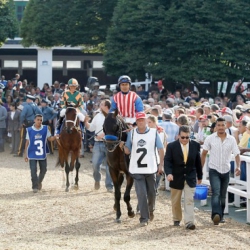The U.S. Third Court of Appeals has set a deadline of January 14 for legal briefs to be filed in the sports betting legal battle between the state of New Jersey and 5 major U.S. sports associations. The appellate court will rule on whether New Jersey can legalize sportsbooks within the state, or whether such sportsbooks pose a serious threat to the integrity of college and pro sports.
The court case stems from a lawsuit filed by the NFL, NBA, Major League Baseball, NHL, and NCAA in October. Those sports associations filed to have sports betting at Monmouth Park stopped immediately. At the time, U.S. District Judge Michael Shipp (brother of ex-NFL player Marcel Shipp) ruled that betting at Monmouth Park was a serious threat to the well-being of those sports leagues. At a further hearing in November, Judge Shipp ruled that New Jersey’s decision to approve gambling at their licensed gaming venues (casinos and racetracks) constituted a backdoor or tacit form of legalization.
Shipp’s Ruling Was Expected
Most of New Jersey’s leaders expected Judge Shipp to rule the way he did, though State Senator Raymond Lesniak expressed bitter disappointment that the decision did not go New Jersey’s way. The state’s political leaders always viewed the U.S. Third Court of Appeals as their best chance to win a legal decision against the sports associations.
When New Jersey first tried to legalize sports betting in 2012, the 5 associations sued the state. The suit went through Judge Shipp’s District Court and the Third Court of Appeals, on its way to the U.S. Supreme Court. In that process, the various rulings went against New Jersey, but the Appeals Court gave the state hope for a better result if certain laws were repealed.
Appellate Court Appears to Be the Key
In the 3-1 ruling by the Court of Appeals in 2013, the opinion rendered suggested that states could not license and regulate sportsbooks, but they could allow such operations to take place, if they chose not to regulate the activities. If strict regulation took place, it would violate the 1992 Professional and Amateur Sports Protection Act, which restricted sports gambling to four U.S. states: Nevada, Delaware, Montana, and Oregon.
In June of 2014, New Jersey’s appeals reached the U.S. Supreme Court, which declined to hear the case. That seemed to end the legal wranglings, but New Jersey’s legislature approved a new law which sought to repeal most provisions of the offending 2011 sports betting laws.
New Jersey’s Legislative Process
Governor Christie vetoed that bill in August 2014, saying the legislation was premature. A second and more streamlined version of that bill was passed in October 2014, which privatized New Jersey’s sportsbook laws. Governor Christie signed that legislation into law just days before the case came before Judge Shipp’s court.
It wasn’t enough. Michael Shipp issued a temporary restraining order against Monmouth Park, saying it could not operate a sportsbook that weekend (or subsequent weekends), as it intended to do. Judge Shipp confirmed that decision weeks later with his own legal opinion. Everyone knew the decision would be appealed to the Third District Court, whatever Shipp’s decision.
Next Step of the Process
That is where the legal case stands at present. It is uncertain whether New Jersey would appeal a decision in the case, if the Third Court of Appeals ruled against it. If so, then the case would be referred to the U.S. Supreme Court once more. Most associated seem to believe the best chance for New Jersey sports gambling comes on January 14.
Governor Christie Versus Commissioner Silver
In the last several days, Governor Chris Christie and NBA Commissioner Adam Silver have sparred over the issue. Throughout this fall, Adam Silver has signaled that the National Basketball Association is ready to support legalized sports betting in the United States, but only at the federal level. Under a 50-state act, Silver seems to believe the NBA could reap large financial benefits from legal sportsbooks, much the way English Premier League football clubs collect sponsorships from UK-based bookmakers.
Governor Christie sees Silver’s position as a “bait and switch” routine, because Silver also signed onto the October lawsuit against New Jersey.
Christie this week told NJTV, “I think it’s kind of crazy for the commissioner of the NBA to say, on one hand, ‘Join me, governor, let’s have legalized sports gaming everywhere. But not in New Jersey right now.’”
Is Jersey Betting a Threat to the NBA?
One reason New Jersey lawmakers and sports gambling pundits don’t understand the sports league’s position on sportsbooks is their main contention: that sportsbooks damage the games’ credibility. This seems to fly in the face of facts, since the NFL and NBA have seen their biggest growth in the past 20 years, when gamblers bet on every single game. How New Jersey sports betting ruins the sport when Nevada gambling doesn’t is a source of mystery.
That question becomes acute when Adam Silver says nationalized sports betting would be good for the NBA, but sports betting at Monmouth Park would threaten the league.
Despite those contentions, Adam Silver continues to say Governor Christie should come around to his view of the issue. Silver told ESPN on Monday, “Gov. Christie, and I’m happy to join him, should turn his attention to Washington, D.C., to Congress, and say, ‘Here are all the reasons it should be regulated.‘”

